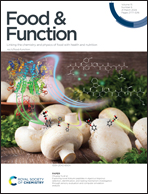Gastrodia elata polysaccharide alleviates Parkinson's disease via inhibiting apoptotic and inflammatory signaling pathways and modulating the gut microbiota†
Abstract
Parkinson's disease (PD) is a common, chronic, and progressive degenerative disease of the central nervous system for which there is no effective treatment. Gastrodia elata is a well-known food and medicine homologous resource with neuroprotective potential. Gastrodia elata polysaccharide (GEP), which is a highly active and safe component in Gastrodia elata, is an important ingredient in the development of functional products. In this study, GEP was administered to 1-methyl-4-phenyl-1,2,3,6-tetrahydropyridine (MPTP)-induced mice over 3 weeks to investigate its neuroprotective effects. The results showed that GEP significantly alleviated the motor dysfunction of PD mice, inhibited the accumulation of α-synuclein, and reduced the loss of dopaminergic neurons in the brain. Moreover, GEP increased the Bcl-2/Bax ratio and decreased the cleaved-caspase-3 level, suggesting that GEP may ameliorate PD by preventing MPTP-induced mitochondrial apoptosis. GEP also significantly inhibited the increase of GFAP and decreased the levels of TNF-α, IL-1β, and IL-6 in the brain of PD mice, which may be the result of the inhibition of neuroinflammation by the inactivation of the TLR4/NF-κB pathway. Furthermore, the neuroprotective effects of GEP involve the gut–brain axis, as it has been shown that GEP regulated the dysbiosis of PD-related gut microbiota such as Akkermansia, Lactobacillus, Bacteroides, Prevotella, and Faecalibacterium, increased the content of microbial metabolites SCFAs in the colon and increased the level of occludin that repairs the intestinal barrier of PD mice. In conclusion, this study is expected to provide a theoretical basis for the development and application of functional products with GEP from the perspective of neuroprotective effects.



 Please wait while we load your content...
Please wait while we load your content...